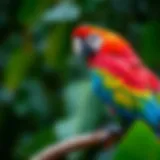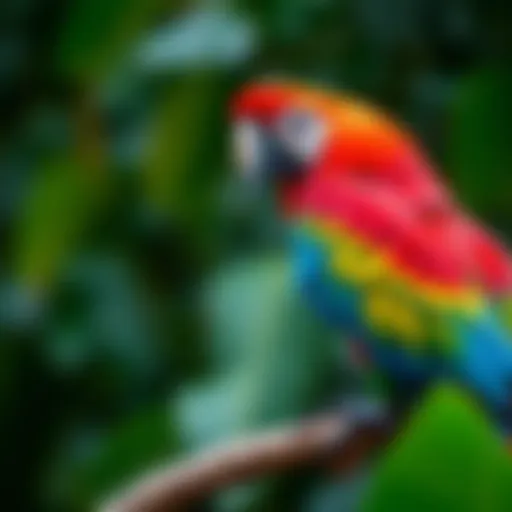Guide to Buying and Caring for Dove Birds
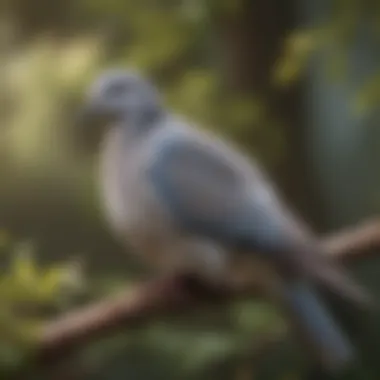

Intro
Bringing a dove into your home can be a rewarding decision, yet it comes with a blend of considerations unique to these gentle creatures. As a potential dove owner, you should approach this journey with a firm understanding of their needs, behaviors, and the nuances of dove care.
In this guide, we will explore key insights that will equip you to make informed decisions about dove ownership. From understanding your pet's behavior to knowing what their living environment entails, this comprehensive resource aims to arm you with knowledge and confidence.
Understanding Your Pet
Pet Behavior Basics
Doves are notably social birds, often known for their gentle cooing and amiable disposition. They thrive on companionship, whether from fellow doves or their human caregivers. It's essential to recognize that doves display varying degrees of curiosity and interaction. You might see them preening each other or flapping their wings in a display of happiness. Understanding these behaviors is the first step in fostering a nurturing environment.
Common Breed Characteristics
There are various species of doves, each with its own set of unique traits. Some common breeds include the Mourning Dove and the Ringneck Dove.
- The Mourning Dove is slender with a long tail and has a soft brown or gray plumage.
- The Ringneck Dove, on the other hand, has a distinctive black crescent across its neck, with a versatile temperament that's ideal for families. Knowing breed differences helps you anticipate the care requirements for each type.
Species-Specific Needs
Different dove species also come with their own specific needs:
- Mourning Doves generally prefer a bit of freedom, enjoying outdoor time when the weather permits.
- Ringneck Doves are typically more adaptable to indoor living and bond strongly with their humans.
Familiarize yourself with the requirements pertinent to the species you plan on adopting to ensure its well-being.
Pet Care and Maintenance
Feeding Guidelines
Proper nutrition is crucial for keeping doves healthy. A balanced diet typically includes:
- High-quality seeds (like millet and canary seed)
- Pelleted foods tailored for doves
- Fresh greens and fruits, such as spinach and apples Consistency in feeding time can also lend a sense of routine for your pet.
Grooming Essentials
Doves require minimal grooming compared to other pets. However, regular check-ups of their feathers can help catch any issues early. Bathing is an aspect where they often need your help. A shallow dish filled with water encourages a refreshing dip which aids in maintaining their sleek appearance.
Hygiene Practices
Keeping your dove's environment clean is non-negotiable. Regularly change their bedding and space, and ensure their food and water sources are fresh. These practices not only promote health but also significantly reduce the chance of disease.
Training and Development
Basic Commands and Skills
While doves aren’t as trainable as dogs, they can learn basic commands and routines. Start with simple tasks like landing on your finger for treats. This encourages bonding, helping to demystify the human-dove interaction.
Behavioral Training Techniques
Use positive reinforcement methods by rewarding your doves with treats for good behavior. Praise can also go a long way in establishing trust and cooperation between you and your dove.
Addressing Common Behavior Issues
If your dove starts to display aggressive behavior, it might be linked to territorial nature or inadequate socialization. Familiarize yourself with signs of distress and intervene gently to create a safe and calm environment.
Health and Wellness
Routine Vet Check-ups
Regular vet visits are critical. Ideally, you should schedule check-ups annually. A specialized avian vet ensures that your dove stays on track with its health.
Vaccination Needs
Vaccinations are important too. Discuss the appropriate shots with your veterinarian. Keeping your dove vaccinated can greatly reduce health risks in a household setting.
Recognizing Signs of Illness
Monitoring your dove for changes in behavior can save lives. Look for signs like a lack of appetite, ruffled feathers, or changes in droppings. Prompt action could make all the difference in recovery if health problems arise.
Enrichment and Activities
Indoor vs. Outdoor Activities
Doves can enjoy both indoor and outdoor activities, but balance is key. Indoor time should include safe perches and open spaces to flit about, while outdoor access provides them with new sights and sounds to explore.
Interactive Toys and Games
Providing a variety of toys can stimulate your dove's mind: wooden blocks, swings, and even simple mirrors can keep them entertained. They get bored easily, so changing toys regularly can be beneficial.
Socialization Opportunities
Doves thrive on interaction, be it with humans or other doves. Sparse interaction can lead to loneliness and behavioral problems. Consider having a pair of doves, if possible, to ensure they have companionship and always keep an eye on how they socialize with family members.
Remember, choosing to include a dove in your family is a commitment that spans years. Being informed and prepared can make all the difference in your journey as a dove owner.
Understanding Dove Birds
Dove birds serve as more than just charming pets; they symbolize peace and can bring warmth to any household. Understanding them is crucial for anyone considering them as pets. A solid grasp of their nature and habits will help owners create an environment conducive to their well-being. From distinguishing species to diving into their unique behaviors, the knowledge gained will pave the way for a fulfilling experience. It’s not just about having a pet but nurturing a living being that requires attention and care.
Overview of Dove Species
Common Species of Doves
Doves are a diverse family, yet some species stand out due to their popularity as pets. The Mourning Dove and Ring-Necked Dove are two prime examples. The Mourning Dove is often recognized by its soft cooing sound and delicate frame, making it a beloved choice. Ring-Necked Doves, on the other hand, boast distinctive markings that many find attractive. Their friendly demeanor and adaptability to various living conditions are particularly favorable.
- Key Characteristic: The subtle beauty of these birds captivates many prospective owners.
- Unique Feature: Notably, the ability of these doves to cohabitate harmoniously makes them excellent for families or multiple-pet households.
- Advantages: Their sociable nature enables them to bond well with humans, fostering a strong relationship with their owners.


However, owning a dove comes with its own set of challenges. For instance, they can be sensitive to environmental changes, making it necessary to ensure a stable habitat.
Characteristics of Popular Dove Breeds
The attributes of popular dove breeds extend beyond appearance. Many enthusiasts favor the Diamond Dove for its sweet, gentle disposition. Another noteworthy breed is the Turtledove, renowned for its calm and comforting behavior.
- Key Characteristic: These breeds are generally smaller and are less demanding in terms of space.
- Unique Feature: For example, Diamond Doves come in a variety of colors, which allows owners to personalize their flock.
- Advantages: Such traits permit them to adapt easily to indoor living without requiring excessive space.
Nevertheless, one must remain aware of their dietary needs and potential emotional distress when kept alone.
Dove Behavior and Social Dynamics
Understanding Dove Communication
Communication among doves is often intricate and nuanced. They utilize sounds, movements, and even their body language to express feelings and needs. Recognizing these signals is essential for fostering a healthy owner-pet relationship. The cooing is a beautiful melody, often signaling contentment or a call for companionship.
- Key Characteristic: Their ability to communicate effectively is a hallmark of this species.
- Unique Feature: For instance, when a dove ruffles its feathers or puffs up, it might indicate stress or discomfort, cues that a responsible owner must heed.
- Advantages: Being attuned to these signals helps prevent potential health issues or emotional distress.
Social Behavior in Doves
Doves are inherently social creatures. They thrive in pairs or groups, which mirrors their natural instinct to flock in the wild. Isolation can lead to depressive behaviors, underscoring the importance of companionship not just with humans, but also with other doves.
- Key Characteristic: Their gregarious nature makes them vibrant additions to family life.
- Unique Feature: For example, when doves engage in preening each other’s feathers, it signifies affection and social bonding, critical components in their emotional well-being.
- Advantages: This behavior not only encourages a nurturing environment but also allows for rich social interactions, suitable for families looking to incorporate doves into their routine.
In summary, understanding dove birds encompasses recognizing the diversity among species, their communication styles, and social dynamics. With this knowledge, prospective owners can cultivate an environment that nurtures and celebrates these gentle creatures.
Evaluating the Decision to Buy Doves
Before diving into the world of dove ownership, it's crucial to take a step back and assess your readiness to bring these birds into your life. Owning a dove, like any pet, demands thoughtful consideration, especially regarding your lifestyle and environment.
This section will guide you through the essential elements to ponder—space, commitment, and the long-term responsibilities involved in caring for doves. Understanding these facets not only helps ensure the well-being of your future pets but also enriches your own experience as a dove owner.
Assessing Your Environment
Space Requirements for Doves
When it comes to keeping doves, space isn't just a luxury; it's a necessity. Doves are active and social creatures that require ample room to thrive. Ideally, a single dove needs a minimum of 2 cubic feet of space to feel comfortable, but more is always better.
The main consideration is the cage size. A tall, spacious cage allows doves to stretch their wings and hop around—this mimics their natural habitat and promotes a healthier lifestyle.
Additionally, if you're considering more than one dove, think about adding at least 1 cubic foot per additional bird. Not only does this prevent territorial disputes, it also encourages social interactions, which are vital for their mental health. A smaller cage can lead to stress and, ultimately, health issues.
Benefits of Proper Space:
- Reduces Stress: More room means less fighting and stress among doves.
- Encourages Exercise: Ample space promotes physical activity, which is crucial for their health.
Environment and Habitat Considerations
Your home's environment plays a huge role in your doves' happiness. The ideal habitat mimics their natural surroundings, allowing them to feel secure and content. Good ventilation is key—as doves can be sensitive to stale air. A well-placed cage by a window (but away from direct sunlight) can provide fresh air and stimulation without exposure to harsh elements.
Cleanliness is another significant factor. Regular cleaning routines are necessary to maintain a healthy living space for your doves. A habitat filled with natural perches and safe materials can also create a sanctuary for your birds, making them feel at ease.
Unique Features of Habitat Considerations:
- A Walk on the Wild Side: Incorporate branches or near-natural perches to allow doves to engage in normal behaviors.
- Avoid High Traffic Areas: A quiet corner of the home can help doves feel less threatened and more at home.
Time and Commitment Required
Daily Care Routines
Owning doves isn’t just about providing food and water. Daily care routines are vital to ensure they remain healthy and happy. Each morning, you’ll need to refill feed and water containers. Fresh food options, like grains and seeds, should also be provided. Doves appreciate a varied diet, which can also include fruits and vegetables.
It's essential to check for waste buildup in their cage daily to maintain cleanliness. This routine not only keeps the environment inviting for the birds but also allows you to monitor their health, catching potential issues early on.
Key Aspects of Daily Care:
- Time and Consistency: Daily tasks may seem overwhelming initially, but they quickly become part of your routine.
- Observation Opportunities: Daily interactions help you understand their personalities and health status.
Long-Term Responsibilities
Doves can live anywhere from 5 to 15 years, so it's worthwhile to recognize the commitment required. This long-term responsibility includes regular veterinary checkups, which should be accounted for in your budget.
Feeding costs, along with habitat maintenance, can add up, but they are necessary investments for your birds' well-being. Moreover, the emotional investment is significant—doves can form strong bonds with their owners, similar to dogs or cats.
Considerations for Long-Term Care:
- Financial Responsibility: Be prepared for ongoing food and healthcare expenses.
- Bonding: Expect to dedicate time each week to build and maintain a close relationship with your doves.
Where to Buy Dove Birds
When it comes to bringing a dove into your home, knowing where to purchase these charming birds is crucial. The choice of vendor can significantly influence not only the bird's health and temperament but also your own satisfaction as an owner. Buying from credible sources ensures better care for the doves and promotes responsible breeding practices. This section delves into different options for acquiring doves, ranging from reputable breeders to pet stores, online marketplaces, and animal shelters.
Reputable Breeders
Finding a Local Breeder
Finding a local breeder is often regarded as one of the smartest moves for prospective dove owners. This option means you are likely to meet the breeder in person, allowing you to assess the living conditions of the doves and their breeding environment. Local breeders often take great care in raising their doves, focusing on health and socialization, which can result in a more well-adjusted pet.
Key characteristic of choosing a local breeder is the personal connection it offers. You can ask questions directly, gain insights about specific dove species you are interested in, and establish a relationship that could help in future guidance about dove care. Plus, you might discover unique traits about the specific breeds that can guide your selection.
A unique feature of this approach is the transparency it provides. Understanding the doves' lineage and how they were raised helps you make a more informed decision about your purchase. However, finding a reputable local breeder might take some time and effort, as not all breeders operate with the same ethical standards, so do your research diligently.
Evaluating Breeder Credibility
Evaluating breeder credibility is essential to ensure you are dealing with someone who prioritizes the health of their doves. A credible breeder should provide documentation regarding the health histories of their birds, along with a clean and spacious living environment for the doves. Asking for references from other customers can also help gauge a breeder’s reputation.
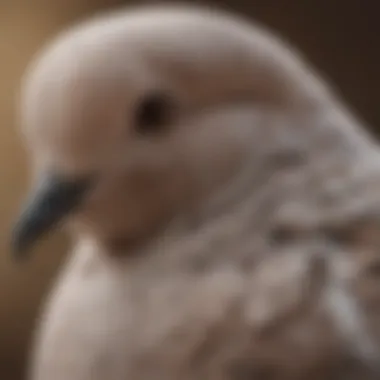

The key characteristic here is the level of accountability and transparency a credible breeder provides. A well-established breeder typically fosters satisfaction through return policies or guarantees, showing confidence in their doves’ health and temperaments.
A unique advantage of working with credible breeders is their knowledge. Many breeders have extensive experience and can offer invaluable advice on care specifics for the particular species you’re interested in. However, high demand for doves may lead to some breeders prioritizing profit over animal welfare, making it crucial to evaluate their practices before proceeding with a purchase.
Pet Stores and Online Retailers
Benefits of Buying from Pet Stores
Pet stores can be a practical choice for buying dove birds, especially for those who prefer immediate availability. They often provide a variety of species and readily accessible supplies that you might need as a new owner. Buying in-store also allows you to see the birds firsthand, which can help you select one that catches your eye and resonates with you.
One significant benefit is the instantaneous purchase experience. You can step in, learn about the birds, and walk out with a new pet in just one visit. Additionally, many pet stores establish partnerships with breeders to ensure the birds they sell are healthy and well-cared for.
However, a downside can be the lack of specialized knowledge that some pet store employees may have. Unlike breeders, who usually focus on a specific type of bird, not all pet stores have staff informed on dove-specific behavior or care.
Exploring Online Marketplaces
Exploring online marketplaces is increasingly modern when acquiring dove birds. Websites allow you to browse a wide selection of doves across various regions. This method can provide opportunities to find rare or less common breeds that might not be available locally.
An essential characteristic of online marketplaces is the amount of information they can offer on specific birds. You can often read detailed profiles that describe the birds’ habits, needs, and any health records. Online purchases can also give you access to breeders who focus on sustainable and ethical practices.
Nevertheless, purchasing online can come with caution. It’s vital to verify the reliability of the seller and look for reviews or ratings from previous buyers. The absence of in-person evaluations means you must be extra vigilant about ensuring the health and temperament of the bird you are about to get.
Animal Shelters and Rescue Organizations
Adoption Benefits
Adopting from animal shelters and rescue organizations is not just a compassionate choice; it can also present unique benefits for potential dove owners. Often, shelters have birds looking for forever homes that may have been neglected or surrendered due to changing family circumstances. By adopting, you’ll not only acquire a pet but also give a second chance to a dove in need, contributing positively to the community.
The key characteristic of adoption is the reduced cost, as fees for adopting a bird are typically lower compared to buying from breeders or stores. This option also encourages responsible pet ownership, as most shelters ensure their birds are healthy and prepared for adoption with appropriate medical care and socialization.
However, it’s important to note that the selection may be limited to the birds available at the time, which means you may not find a specific breed you were aiming for right away.
Connecting with Local Shelters
Connecting with local shelters can enhance the chances of finding a match suited to your needs while also forging community ties. Many shelters provide opportunities to learn about the specific doves they have for adoption as well as their histories, temperaments, and needs. It’s not uncommon for shelters to hold community events that can help you engage with the birds in a meaningful way.
This characteristic of local shelters is an inviting atmosphere they foster, promoting education about dove care and welfare among potential adopters. Many shelters are staffed with knowledgeable individuals who can share insights about the birds, helping you make informed decisions about your future dove companion.
On the flip side, adopting from shelters might require more time and patience. The process can involve paperwork, and some shelters conduct home visits to ensure a safe environment for their birds, which may delay the adoption process.
"Where you choose to buy your dove matters just like which dove you choose. Research and approach with care. "
Selecting Healthy Doves
Choosing a dove is not just about being charmed by its beauty; it’s about ensuring you pick a bird that’s going to thrive in your environment. Healthy doves often equate to happy doves, which can lead to an enriching experience for both them and you. By paying close attention to certain indicators and signs of well-being, buyers can ensure that they welcome a sturdy feathered companion into their lives. Here, we will dive into the essential physical and behavioral characteristics to look out for, guiding you effectively in selecting doves that are fit and vibrant.
Physical Characteristics to Look For
Signs of a Healthy Dove
When assessing a healthy dove, a few key aspects can make all the difference. Begin with the dove's feathers; they should be smooth, glossy, and firmly attached to the body. If the feathers look dull or disheveled, that's a red flag. Eyes are another area to scrutinize; you want them to be bright and clear without any discharge. A dove that's in good shape might also exhibit a well-rounded body, free from any unusual lumps or signs of distress. This physical robustness is crucial as it sets a solid foundation for the dove to adapt to its new home.
In short, the attributes of a healthy dove offer a co-dependent relationship with its overall well-being. If you select a dove that appears lively and healthy, you’re likely to have an easier time with care and companionship.
Common Health Issues in Doves
Understanding health issues common in doves is equally essential. Doves can suffer from a variety of conditions, such as psittacosis or respiratory problems, often manifested through wheezing or coughing. These issues can easily go unnoticed during the excitement of a purchase. Recognizing the symptoms can save future headaches; for example, swollen feet can indicate conditions like arthritis.
Keep a keen eye on your dove’s eating habits; a sudden drop in food intake or excessive eating can signal underlying concerns. Equip yourself with knowledge about these potential ailments. If a caged dove shows signs of illness, the impact ripples out—affecting your peace of mind and the dove’s integration into your life.
Behavioral Indicators of Health
Active vs. Lethargic Doves
Behavior is just as telling as physical appearance. Active doves are usually chirpy and curious, flitting about their space, and showing interest in their surroundings. In stark contrast, lethargic doves may sit motionless or display poor posture, which often suggests an ongoing health concern. These behavioral signs will help you gauge if your chosen dove is ready to mingle or if it needs some TLC.
Choosing to adopt an active dove can be beneficial for both interaction and overall engagement. Remember, selecting a lively dove ensures you’re not just getting a pet, but a vibrant member of your family.
Social Interactions as Health Indicators
Lastly, don't underestimate the value of social dynamics. Doves that are healthy often engage well with other birds or even those around them. If they shy away from contact or show signs of aggression, it may be a sign of distress or illness. Conversely, if a dove confidently interacts and enjoys the company of its peers, it indicates strong emotional health.
By observing social interactions, you can better gauge how a dove will fit into your family dynamics. Opt for a bird that is not only physically healthy but also well-adjusted emotionally. This ensures that you introduce a harmonious spirit into your home.
Remember, investing time in understanding these diverse aspects of selecting a healthy dove not only enriches your pet ownership experience but also significantly contributes to the well-being of your new friend.
Preparing for Dove Ownership
Owning doves is a significant commitment, and being ready for this journey is paramount. As charming and peaceful companions, doves bring joy into the home, but they are not without their demands. Preparing for dove ownership means creating an environment conducive to their well-being and happiness. This preparation is essential not just for the birds, but also for the owners who will take on the responsibility of caring for these gentle creatures.
Housing Requirements
Types of Suitable Cages
A suitable cage for doves is not just a luxury; it is a fundamental necessity. Doves require enough space to move around freely without feeling cramped. Suitable cages should be spacious, with a minimum height of 24 inches and width of 30 inches. One of the best choices for doves is a flight cage, which offers the vertical and horizontal space they need to stretch their wings and engage in natural behaviors.
Key Characteristics: Flight cages are often designed with horizontal bars, allowing doves to climb and explore more extensively. This design serves their need for exercise and exploration, essential for their mental stimulation.
Advantages: Having a spacious cage encourages physical activity, reducing stress and potential health issues in doves. However, keep in mind that these cages can be challenging to fit into smaller spaces.
Essential Cage Accessories
When setting up a home for your doves, it’s crucial to include essential accessories in their cage. These accessories enhance their living environment and contribute significantly to their physical and mental health.
Key Characteristics: perches, nesting boxes, and toys are vital for providing doves with variety and stimulation. Naturally shaped wooden perches are a popular choice as they mimic their natural habitat while helping with foot health.
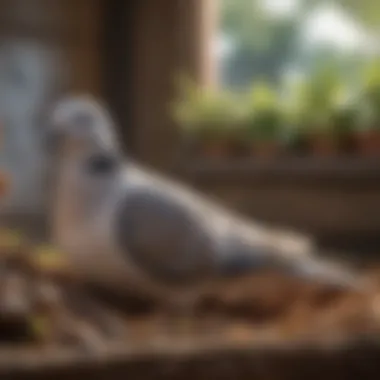

Advantages: Engaging toys can keep the doves entertained and can help prevent boredom-related behaviors. While accessories are important, too many can clutter the cage and may overwhelm the birds, so finding a balance is essential.
Diet and Nutrition Needs
Basic Diet for Doves
What you feed your doves plays a critical role in their health and longevity. A balanced diet that primarily consists of high-quality seeds and grains forms the foundation of their nutrition. Small seed mixes made for doves usually contain millet, canary seed, and oat groats.
Key Characteristics: These mixes provide essential nutrients and ensure that doves get the variety they need. Moreover, fresh fruits and vegetables should be offered to boost their diet with vitamins and hydration.
Advantages: A well-rounded diet supports strong immune systems in doves while also promoting vibrant plumage. However, feeding too many fatty seeds can lead to obesity, which is something to carefully monitor.
Supplementing Dove Diet with Treats
Now and then, it’s nice to treat your doves with special items that can complement their diet. Healthy treats like millet sprays or small amounts of unsalted nuts can provide enjoyment and enrichment. Supplementing their diet allows for a more varied and enjoyable feeding experience.
Key Characteristics: Treats should be given sparingly, ensuring they do not exceed 10% of the overall diet. Treats can also be a powerful tool for building trust.
Advantages: Positive interactions during feeding can enhance the bond between the owner and the doves. However, be cautious with treats containing added sugars or salts as they could be harmful.
Healthcare Considerations
Finding an Avian Veterinarian
Choosing the right veterinarian for your doves is crucial. Not every general veterinary practice is equipped to handle birds, so it’s vital to seek out an avian veterinarian experienced in caring for doves specifically.
Key Characteristics: An avian specialist understands the unique health needs and behaviors of doves, providing the best care possible. They can assist with vaccinations, regular check-ups, and any emergencies.
Advantages: Regular visits to an avian vet help in the early detection of health issues, ensuring your doves live long, fulfilling lives. However, avian vets can be more expensive than regular ones, and availability may vary based on location.
Routine Health Care Practices
Maintaining routine health practices can make all the difference in ensuring your doves flourish. Regular cleaning of their cages, monitoring their diet, and observing their behavior are crucial components of good dove health care.
Key Characteristics: Establishing a routine helps catch any changes in health before they become serious. Doves are social creatures; changes in their behavior can often indicate underlying health issues, so vigilance is important.
Advantages: With consistent care, owners are more likely to create a harmonious environment for their doves, allowing them to thrive. On the flip side, neglecting these routine practices can quickly lead to health declines.
A committed dove owner prioritizes the well-being of their birds through thoughtful preparation in housing, diet, and health care. By taking the time to understand their needs, you can provide a nurturing environment that allows them to flourish.
Integrating Doves into Your Home
Bringing dove birds into your home is a significant decision, intertwining your family dynamics and the wellbeing of these beautiful creatures. It’s crucial to create an environment that allows both doves and family members to thrive. The approach to integrating doves isn’t just about the physical space but also about emotional connections and social interactions. A harmonious setup encourages bonding and trust while fostering an enjoyable experience for all involved.
Introducing Doves to Family Members
Children and Doves
Introducing doves to children can significantly cultivate compassion and responsibility. Kids often are curious and full of energy, making their interactions with doves a learning experience. Children develop empathy as they learn to tend to the needs of these birds. Teaching kids to handle them gently helps in fostering a meaningful bond.
Placing emphasis on gentle behavior becomes paramount. You will find it beneficial when children understand to approach doves calmly. This creates a positive energy that doves respond to well. However, it’s vital to supervise these interactions, as young children might not fully grasp the boundaries that keep both doves and themselves safe.
In essence, having doves in a home with children can be quite popular. The natural curiosity of children blends well with the gentle demeanor of doves.
Creating a Calm Environment
A calm environment is fundamental when integrating doves into a home. It contributes to their comfort and overall mental health. Doves thrive on peaceful surroundings and can become skittish if they sense chaos. A thoughtfully designed space with minimal loud noises and predictable routines helps both birds and family members connect in a soothing atmosphere.
When creating this environment, consider their habitat—it should be tranquil, providing a safe retreat. You can use soft colors and avoid clutter to pull this off. The unique aspect of a calm environment is its ability to promote relaxation; Doves feel secure and can showcase their natural behaviors freely.
While this is beneficial, achieving this calmness may require a lifestyle adjustment. This means limiting loud gadgets or chaotic gatherings at home, ensuring your doves feel secure.
Socialization Techniques
Building Trust with Your Doves
Building trust is an essential component when it comes to dove ownership. Establishing a bond takes patience and consistent interactions. The more time you spend near them, introducing soft voices and gentle gestures, the more comfortable they will feel around you. This step aligns with their natural behavior—they bond with caregivers who offer them a safe and nurturing environment.
The main characteristic of trust-building lies in the repeated positive experiences. Over time, you’ll notice your doves becoming more relaxed, perhaps even approaching you willingly. It’s rewarding yet requires effort, making it an important aspect of dove care.
One unique feature here is that trust can transcend between the members of your household, so a united front in treating the birds gently is crucial. However, if the technique is rushed, it can lead to stress for the doves, which contradicts your ultimate goal.
Encouraging Positive Interactions
Encouraging positive interactions involves creating daily routines that highlight affection and care. Whether it’s handling them gently, letting them perch on your finger, or simply talking to them, these simple acts contribute to positive engagement. Doves are social creatures, and they respond well to attention and kindness.
The key characteristic of this approach is that it transforms your doves from mere pets into cherished family members. When you engage regularly with them, they show more vibrant behaviors, further enriching your home life. The distinctive feature of these interactions is their ability to build an emotional connection.
However, it’s vital to balance interaction with independence. Doves also appreciate their personal space. Thus, being attentive to their needs can lead to a beautiful relationship that balances care with freedom.
The journey of integrating doves into your home is one of gradual trust and mutual respect.
As you see it, integrating doves into your household community requires thoughtful planning and engagement. Understanding these elements and actively implementing them can make your dove ownership experience rewarding.
Culmination
In wrapping up the intricate journey of dove ownership, it becomes crystal clear that understanding the nuances associated with these delightful creatures is paramount. This article has walked prospective dove owners through various stages, from the very decision to bring these gentle birds into their lives to the essential care they require.
Recap of Key Points
Reflecting on the crucial aspects covered:
- Understanding Dove Species: Gaining knowledge of the different species helps potential owners select the right breed that suits their lifestyle and preferences.
- Evaluating Decision to Buy Doves: Analyzing one’s environment and personal commitments ensures that the decision to add doves to the family is well-informed.
- Where to Buy Doves: Knowing reliable sources such as reputable breeders, pet stores, and shelters helps make sound purchasing choices.
- Selecting Healthy Doves: Paying attention to physical and behavioral signs can guide buyers toward healthier options.
- Preparing for Dove Ownership: Adequate preparations, such as establishing housing and understanding dietary needs, lay a strong foundation for dove care.
- Integrating Doves into Your Home: Techniques to introduce doves to family members foster a smooth transition into the home environment.
"A well-prepared owner is the key to a happy dove."
Moving Forward with Dove Care
Once the decision has been made to welcome doves into your home, the next step involves embracing ongoing care and engagement.
- Daily Routines: Establishing consistent care routines, including feeding, cleaning, and social interaction, is critical in maintaining happy and healthy doves. This also aids in forming a strong bond between the birds and their owners.
- Long-Term Commitment: Understand that doves can be companions for many years. Preparing mentally and emotionally for this commitment is just as vital as the physical aspects. It's essential to stay informed about dove health and adapt care approaches as needed.
- Continuous Learning: Keep abreast of new information regarding dove care. Joining relevant communities or extended resources, like animal forums on reddit.com or local pet groups on facebook.com, can provide valuable support and fresh ideas.
By taking these elements to heart, new dove owners can navigate their responsibilities with confidence, ensuring a fulfilling partnership with their feathered friends.


